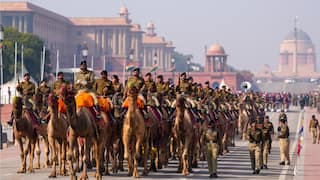Explorer
Vijaya Dashami speech: Bhagwat's message is of collective reconstruction

This time the RSS's Vijaya Dashami programme on Tuesday was discussed and commented upon by many for the change in the Sangh's dress-code. That's frivolity. If you missed it, a reading of Sarsanghachalak Mohan Bhagwat's Vijaya Dashami speech would show how the RSS, while keeping its ideological roots intact, now seeks to play a participatory, inclusive and constructive role in the national makeover. That is the clear message of his speech.
The manufactured controversy over the live telecast of the RSS's Vijaya Dashami programme should not distract distract from the contours of the Sarsanghachalak's speech. What he said is far more important than the means of communication.
Since 2012 many websites have been live-streaming this programme. With the growing stature of the RSS's thinking in policy-making, many private and commercial channels have found news value in broadcasting the Sarsanghachalak's annual speech live. Doordarshan broadcasting it live provides them with ready-to-air feed.
Sarsanghachalaks have been delivering speeches on the occasion of Vijaya Dashami from the inception of the RSS. They have been commenting not only on organisational matters but also on issues of national importance, giving a national perspective. Swayamsevaks occupy important positions in almost every walk of life. The RSS's perspective on issues facing the nation is of interest not only to them but everybody else. Hence broadcasting it makes eminent sense.
Mohan Bhagwat invoked four names in his speech, namely, Kashmiri Shaivite Saint Acharya Abhinavgupta, Acharya Ramanuja, a Vaishnavite guru from south India, Guru Gobind Singh, a Sikh Guru equally revered by all, and Gulabrao Maharaj, an intellectual miracle from Maharashtra whose death centenary is being observed.
Those with an agenda would seek out the caste and community of these great Indians mentioned by Mohan Bhagwat. But if we look at the context of his speech, he has delivered a three-fold profound message.
First, seeking unity in diversity is the fundamental spiritual principle of Bharat and is common to all sects, irrespective of differences in its expression.
Second, all the great Indians named by Mohan Bhagwat stood and fought for the cultural and emotional integration of Bharat.
Third, these great leaders provide a holistic perspective on life, and not a divisive one, a fact many would vouch for.
Mohan Bhagwat's mention that ‘Kashmiriyat’ cannot be complete without the Shaivism of Acharya Abhinavgupta is of special significance. Unfortunately, the so-called experts on Jammu & Kashmir get carried away by the separatist narrative, as if ‘Kashmiriyat’ is nothing but ‘Islamic Wahabism’.
It is important to be reminded, and remember, that Wahabism entered Kashmir Valley with separatism and terrorism, that the roots of real Kashmiriyat are in Shaivism which rests on the belief that all ways of worship lead to the same god. This blunt reminder while reiterating support for the national claim on Pakistan-occupied Jammu & Kashmir is in tune with our Constitution and diplomatic position. There is no dispute over it.
The most important aspect of this year’s Vijaya Dashami speech was Mohan Bhagwat's clear and unequivocal stand on social transformation. His call to build an "organised, mighty, non-exploitative, equitable, complete and rich national life" in harmony with our Sanatana Dharma and culture is a rebuke to detractors who project the RSS as a "Right-wing organisation", using that description as a pejorative term.
What Mohan Bhagwat has outlined in his Vijaya Dashami speech is the action programme of the RSS, adopted after surveying caste-based discrimination in many States. His message to political parties and intellectuals is simple: Build a narrative for bridging the gap between various social groups instead of widening it for narrow interests; and, work on finding solutions rather than just discussing existing problems.
Despite the MSM's jugglery on Gau Raksha and Gau Seva, the Sarsanghachalak clarified the RSS's view for the benefit of rumourmongers. What he said is unexceptionable:
Cow protection is part of the vision of our Constitution-makers;
Many cow protection laws have been promulgated by successive Governments in various States and they should be implemented both in letter and spirit; and,
There are many organisations who are constructively engaged in gau seva which is essential for the economic, social and cultural interests of the nation.
While saying all this he did not defend the unlawful activities of some in the guise of gau raksha. In fact, his message that "cow protectors cannot be compared with these undesirable elements who are raking up the issue of cow slaughter or spreading unfounded rumours about cow slaughter" was perfectly articulated.
The RSS speaking on education infuriates many people, especially our Left-liberal intellectuals. As if an organisation that works for and inspires thousands of schools that operate across the country without any Government assistance has no right to speak about education, just because vested interests feel that amounts to "saffronisation".
What's wrong if Mohan Bhagwat insists, as he did, on affordable and accessible quality education, and the participation of teachers in designing the new education policy? Why does it make those who have run India's education system and institutions to the ground, so insecure? Are they worried education reforms will put them out of business?
For decades there has been much talk of education reforms but there is little to show for actual systemic reforms. All sections of society are concerned about the state of education in our country. They want changes that are meaningful, changes that will help Young India meet its rising aspirations. Addressing their concerns is our national duty and nobody should have a problem with that. Unless the purpose behind criticising the Sarsanghachalak is to maintain the status quo so that vested interests are not disturbed.
The Sarsanghachalak praising the Modi Government, especially for its successes on the diplomatic front, or congratulating the Armed Forces for their act of valour through the surgical strikes across the LoC, seems to have given a tummy ache to some people. It is a fact that ever since the Modi Government assumed office, Bharat’s stature has gone up globally and every Bharatiya is proud of it. As a nation we have come a long way, and, as Mohan Bhagwat said, "there's still a long way to go". Only those rattled by Bharat's success and new found confidence would find this proposition problematic.
The core message of this year's Vijaya Dashami speech was to work for emotional integration for the larger objective of national reconstruction. Though the message was essentially for swayamsevaks, the Sarsanghachalak gave an open call to all to join and experience the RSS's work instead of being mute spectators or critics.
No cloistered organisation would call for mass participation. Only an organisation committed to the nation and its welfare would. That simple message, of course, would be lost on compulsive critics and haters of the RSS. But the RSS is, and will remain, undeterred in its national task. And, to remain relevant in the national discourse, you can't ignore the RSS.
Disclaimer: The opinions, beliefs and views expressed by the various authors and forum participants on this website are personal and do not reflect the opinions, beliefs and views of ABP News Network Pvt Ltd.
Follow Blog News on ABP Live for more latest stories and trending topics. Watch breaking news and top headlines online on ABP News LIVE TV
View More



























